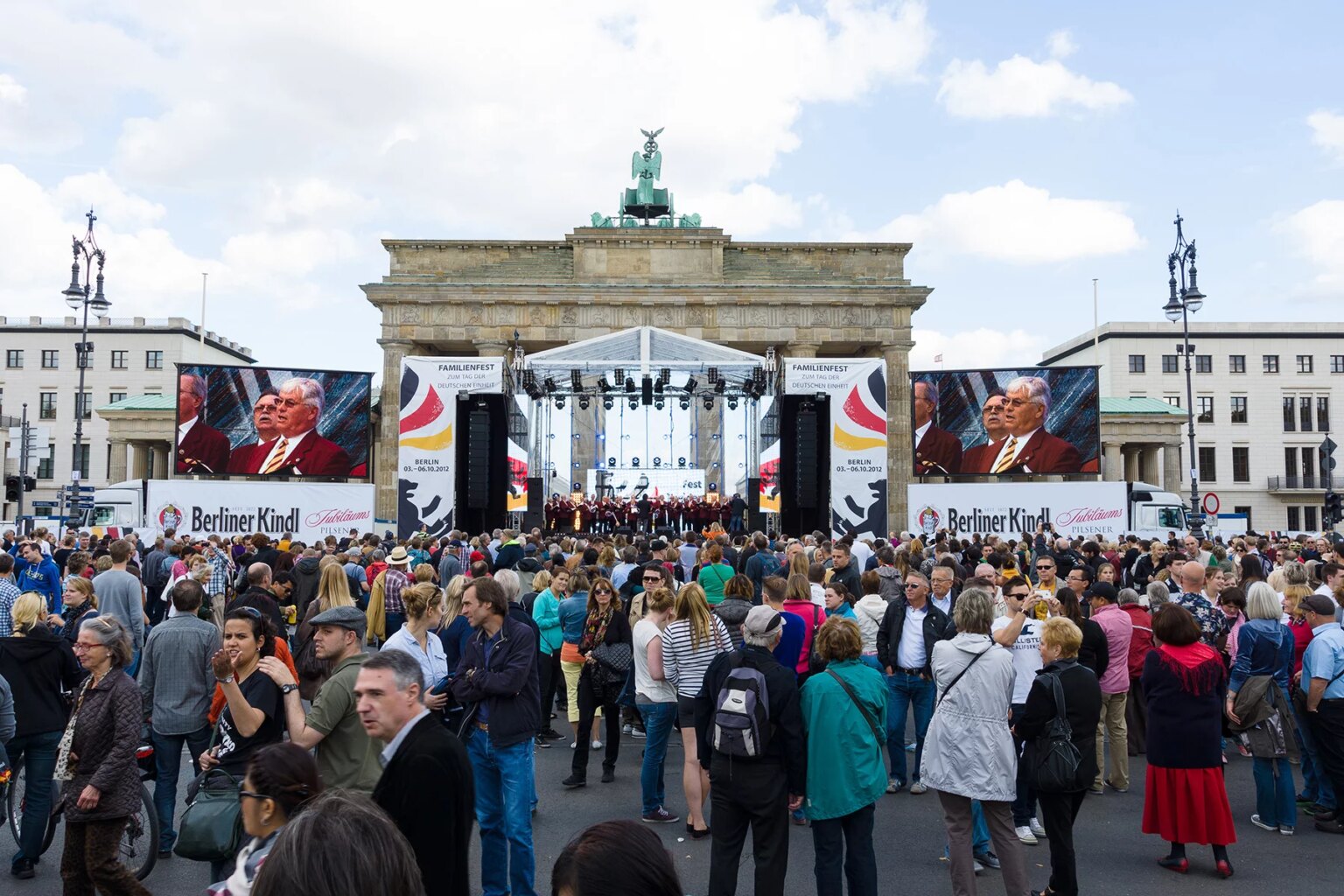When you’re living in Germany, you’ll want to know when the public holidays are. Not only is it important for making special plans, but also because businesses and public institutions will close or have reduced hours on these days.
For travellers and expats, holidays also require some financial planning. Whether you’re budgeting for festival attendance, purchasing gifts, or planning getaways, managing your money across borders can be challenging. Using services like Wise can offer competitive exchange rates and transparent fees for currency conversion.
Jot down these holidays to make sure you don’t miss out on the fun:
Spotahome
Looking for somewhere to rent in Germany? Spotahome takes the hassle out of househunting by doing the hard work for you. Their online platform lets you find, view, and book rental properties all from the comfort of your own home. Take the stress out of househunting in Germany with Spotahome.
An overview of public holidays in Germany
There are nine official national public holidays in Germany each year, alongside local festivities particular to certain states. This means that some states in the country have more vacation days than others.
If the odds are in your favor, you can enjoy up to 13 days off a year, one of the highest public holiday entitlements in Europe. Do note, however, that if the holiday falls on a weekend, it typically does not transfer to a weekday.

Many of the public holidays are religious and date back centuries. Some holidays, however, are more recent, such as the Day of German Unity. Taking place on 3 October every year, it commemorates the anniversary of the country’s reunification in 1990.
If you’re planning to attend these celebrations, it’s worth preparing financially, especially if you’re traveling from abroad. Using the Wise account to convert your currency at the mid-market exchange rate can help you avoid the inflated tourist rates often found at airport kiosks and local exchange offices during busy holiday periods.

Some national holidays also coincide with Germany’s top festivals, which are a great way to experience local culture and sample regional food.
When are Germany’s public holidays in 2025?
These holidays are celebrated nationwide in Germany:
| Date | Weekday | National holiday |
| 1 January 2025 | Wed | New Year’s Day |
| 18 April 2025 | Fri | Good Friday |
| 21 April 2025 | Mon | Easter Monday |
| 1 May 2025 | Thu | Labor Day / May Day |
| 29 May 2025 | Thu | Ascension Day |
| 8 June 2025 | Mon | Whit Monday |
| 3 October 2025 | Fri | Day of German Unity |
| 25 December 2025 | Thu | Christmas Day |
| 26 December 2025 | Fri | Boxing Day |
Local holidays in 2025
These holidays are only celebrated in certain German regions:
| Date | Weekday | Holiday | Where celebrated |
| 6 January 2025 | Mon | Epiphany | Baden-Württemberg, Bavaria, and Saxony-Anhalt |
| 8 March 2025 | Sat | International Women’s Day | Berlin and Mecklenburg-Vorpommern |
| 20 April 2025 | Sun | Easter Sunday | Brandenburg |
| 8 May 2025 | Thu | End of World War II | Berlin |
| 8 June 2025 | Sun | Whit Sunday | Brandenburg |
| 19 June 2025 | Thu | Corpus Christi | Baden-Württemberg, Bavaria, Hesse, North Rhine-Westphalia, Rhineland-Palatinate, Saarland, and some parts of Saxony and Thuringia |
| 15 August 2025 | Fri | Assumption of Mary | Bavaria and Saarland |
| 20 September 2025 | Sat | World Children’s Day | Thuringia |
| 31 October 2025 | Fri | Reformation Day | Brandenburg, Bremen, Hamburg, Mecklenburg-Vorpommern, Lower-Saxony, Saxony, Saxony-Anhalt, Schleswig-Holstein, and Thuringia |
| 1 November 2025 | Sat | All Saints’ Day | Baden-Württemberg, Bavaria, North Rhine-Westphalia, Rhineland-Palatinate, and Saarland |
| 19 November 2025 | Wed | Repentance Day | Saxony |
Wise account
Are you an expat or thinking of moving to Germany? Managing your money across borders shouldn’t be complicated. With a Wise account, you can hold over 40 currencies and pay with a Wise debit card in more than 150 countries. Whether you need to spend abroad, receive or send money home, Wise can help make international money management simpler.
Other important dates in 2025
Alongside national and local holidays, you’ll want to make note of these other prominent dates in Germany:
| Date(s) | Weekday(s) | Occasion |
| 3–5 March 2025 | Mon–Wed | Carnival |
| 17 April 2025 | Thu | Maundy Thursday |
| 8 May 2025 | Wed | End of World War II (in some regions) |
| 11 May 2025 | Sun | Mother’s Day |
| 29 May 2025 | Thu | Father’s Day |
| 20 September 2025 | Sat | Start of Oktoberfest |
| 11 November 2025 | Tue | St Martin’s Day – when children typically make lanterns and walk in processions |
| 17 November 2025 | Mon | National Day of Mourning |
| 31 December 2025 | Wed | New Year’s Eve |
When are Germany’s public holidays in 2026?
| Date | Weekday | National holiday |
| 1 January 2026 | Thu | New Year’s Day |
| 3 April 2026 | Fri | Good Friday |
| 6 April 2026 | Mon | Easter Monday |
| 1 May 2026 | Fri | Labor Day / May Day |
| 14 May 2026 | Thu | Ascension Day |
| 25 May 2026 | Mon | Whit Monday |
| 3 October 2026 | Sat | Day of German Unity |
| 25 December 2026 | Fri | Christmas Day |
| 26 December 2026 | Sat | Boxing Day |
Local holidays in 2026
| Date | Weekday | Holiday | Where celebrated |
| 6 January 2026 | Tue | Epiphany | Baden-Württemberg, Bavaria, and Saxony-Anhalt |
| 8 March 2026 | Sun | International Women’s Day | Berlin and Mecklenburg-Vorpommern |
| 5 April 2026 | Sun | Easter Sunday | Brandenburg |
| 24 May 2026 | Sun | Whit Sunday | Brandenburg |
| 4 June 2026 | Thu | Corpus Christi | Baden-Württemberg, Bavaria, Hesse, North Rhine-Westphalia, Rhineland-Palatinate, Saarland, and some parts of Saxony and Thuringia |
| 15 August 2026 | Sat | Assumption of Mary | Bavaria and Saarland |
| 20 September 2026 | Sun | World Children’s Day | Thuringia |
| 31 October 2026 | Sat | Reformation Day | Brandenburg, Bremen, Hamburg, Mecklenburg-Vorpommern, Lower-Saxony, Saxony, Saxony-Anhalt, Schleswig-Holstein, and Thuringia |
| 1 November 2026 | Sun | All Saints’ Day | Baden-Württemberg, Bavaria, North Rhine-Westphalia, Rhineland-Palatinate, and Saarland |
| 18 November 2026 | Wed | Repentance Day | Saxony |
Other important dates in 2026
Alongside national and local holidays, you’ll want to make note of these other prominent dates in Germany:
| Date(s) | Weekday(s) | Occasion |
| 9–11 February 2026 | Mon–Wed | Carnival |
| 2 April 2026 | Thu | Maundy Thursday |
| 8 May 2026 | Thu | End of World War II (in some regions) |
| 10 May 2026 | Sun | Mother’s Day |
| 14 May 2026 | Thu | Father’s Day |
| 19 September 2026 | Sat | Start of Oktoberfest |
| 11 November 2026 | Wed | St Martin’s Day – when children typically make lanterns and walk in processions |
| 17 November 2026 | Tue | National Day of Mourning |
| 31 December 2026 | Thu | New Year’s Eve |
When were Germany’s public holidays in 2024?
| Date | Weekday | National holiday |
| 1 January 2026 | Mon | New Year’s Day |
| 29 March 2026 | Fri | Good Friday |
| 1 April 2026 | Mon | Easter Monday |
| 1 May 2026 | Wed | Labor Day / May Day |
| 9 May 2026 | Thu | Ascension Day |
| 20 May 2026 | Mon | Whit Monday |
| 3 October 2026 | Thu | Day of German Unity |
| 25 December 2026 | Wed | Christmas Day |
| 26 December 2026 | Thu | Boxing Day |
Local holidays in 2024
These holidays are only celebrated in certain German regions:
| Date | Weekday | Holiday | Where celebrated |
| 6 January 2024 | Sat | Epiphany | Baden-Württemberg, Bavaria, and Saxony-Anhalt |
| 8 March 2024 | Fri | International Women’s Day | Berlin and Mecklenburg-Vorpommern |
| 31 March 2024 | Sun | Easter Sunday | Brandenburg |
| 19 May 2024 | Sun | Whit Sunday | Brandenburg |
| 30 May 2024 | Thu | Corpus Christi | Baden-Württemberg, Bavaria, Hesse, North Rhine-Westphalia, Rhineland-Palatinate, Saarland, and some parts of Saxony and Thuringia |
| 15 August 2024 | Thu | Assumption of Mary | Bavaria and Saarland |
| 20 September 2024 | Fri | World Children’s Day | Thuringia |
| 31 October 2024 | Thu | Reformation Day | Brandenburg, Bremen, Hamburg, Mecklenburg-Vorpommern, Lower-Saxony, Saxony, Saxony-Anhalt, Schleswig-Holstein, and Thuringia |
| 1 November 2024 | Fri | All Saints’ Day | Baden-Württemberg, Bavaria, North Rhine-Westphalia, Rhineland-Palatinate, and Saarland |
| 20 November 2024 | Wed | Repentance Day | Saxony |
Other important dates in 2024
| Date(s) | Weekday(s) | Occasion |
| 12–14 February 2024 | Mon–Wed | Carnival |
| 28 March 2024 | Thu | Maundy Thursday |
| 8 May 2024 | Wed | End of World War II (in some regions) |
| 9 May 2024 | Thu | Father’s Day |
| 12 May 2024 | Sun | Mother’s Day |
| 21 September 2024 | Sat | Start of Oktoberfest |
| 9 November 2024 | Sat | 35-year anniversary of the fall of the Berlin Wall |
| 11 November 2024 | Mon | St Martin’s Day – when children typically make lanterns and walk in processions |
| 17 November 2024 | Sun | National Day of Mourning |
| 31 December 2024 | Tue | New Year’s Eve |
When are the school holidays in Germany?
Many public holidays coincide with school vacations in German schools. Wondering when your children will be free? Read more about school holidays in Germany.
Practical tips for German holiday travel
Cultural considerations
Germans value punctuality highly, so arrive on time for reservations, tours, and appointments, and appreciate directness in communication rather than excessive small talk. Business hours are generally respected, with most shops closing by 8 PM on weekdays and 6 PM on Saturdays, and nearly everything closes on Sundays except restaurants and tourist attractions. Learning basic German phrases like “Guten Tag,” “Bitte,” and “Danke” shows respect and is appreciated, though English is widely spoken, especially among younger Germans and in tourist areas.
Food and drink
German cuisine extends far beyond stereotypes, offering regional specialties that reflect the country’s diverse geography and cultural influences, paired with one of the world’s great beer traditions. Don’t miss traditional experiences like visiting beer gardens with their communal tables and relaxed atmosphere, exploring local markets for fresh regional produce, and trying seasonal specialties like asparagus in spring or game in autumn. Make reservations at popular restaurants, especially for weekend dinners, and embrace the German approach to dining that values hearty portions, quality ingredients, and social meals that can extend for hours with good conversation and multiple beer tastings.
Conclusion
German holidays offer a rich opportunity to experience the country’s culture and traditions. By planning ahead—knowing both national and local holiday dates, understanding transportation, and preparing financially—you can fully immerse yourself in these special celebrations.
For international visitors and expats, smart money management is a key part of holiday planning. Setting up a Wise account before traveling to Germany can give you access to competitive currency exchange rates, and a debit card to spend like a local. This financial preparation allows you to focus on what really matters—enjoying Germany’s vibrant holiday traditions and creating lasting memories.







